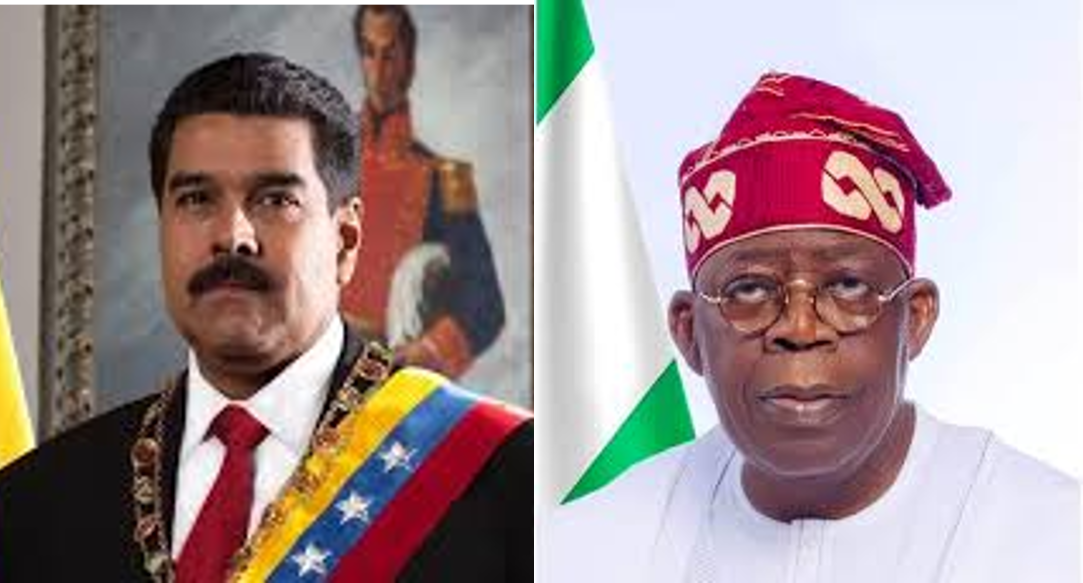
U.S. Offers $25M Bounty for Venezuela’s Maduro Over Cocaine Trafficking While Delaying Release of Nigerian President Tinubu’s Heroin Case Files

In a development that has raised serious questions about the U.S. government’s consistency in addressing international drug-related crimes, American authorities have renewed and expanded their pursuit of Venezuelan President Nicolás Maduro, placing a $25 million bounty on his head over charges of drug trafficking and narco-terrorism.
Meanwhile, in a separate case involving Nigerian President Bola Tinubu, U.S. law enforcement agencies have continued to delay the release of unredacted documents related to a 1993 heroin trafficking investigation, despite a U.S. federal court order and mounting public pressure.
This disparity in treatment is “strategic justice”, a selective enforcement of drug-related accountability based on geopolitical convenience rather than consistent legal principles.
On July 23, the U.S. Department of State reaffirmed its designation of President Nicolás Maduro as a major player in international cocaine trafficking. The Department of Justice had previously unsealed indictments in 2020 accusing Maduro and top Venezuelan officials of leading the “Cartel de los Soles”, a drug cartel allegedly responsible for smuggling hundreds of tons of cocaine into the U.S. annually.
A $25 million reward is now offered for information leading to Maduro’s arrest and conviction, underscoring the seriousness with which Washington views his alleged offences.
Maduro and his associates betrayed the Venezuelan people and corrupted Venezuelan institutions to flood the United States with cocaine,” the DOJ said in a statement.
The U.S. government has backed these charges with diplomatic isolation, financial sanctions, and covert anti-narcotics operations in the region.
U.S.-Backed Venezuelan Opposition Leader Barred from Election
The Maduro government recently claimed victory in Venezuela’s controversial 2024 presidential election, which was widely condemned by the international community as neither free nor fair.
The United States had openly supported opposition leader María Corina Machado, a ‘pro-democracy’ activist who won the opposition’s primary in 2023. However, Venezuela’s Supreme Court banned her from running, citing questionable administrative charges.
In response, the opposition coalition backed Edmundo González, a former diplomat, as their unity candidate. Despite international scrutiny and U.S. warnings that sanctions would follow a rigged vote, Maduro was declared the winner on July 28, 2024.
Tinubu: Files Buried, Questions Unanswered
In contrast, U.S. federal agencies have refused for years to fully disclose files relating to Tinubu’s alleged ties to a 1990s heroin trafficking and money laundering operation in Chicago.
Court documents from 1993 show that Tinubu forfeited $460,000 to the U.S. government in connection with bank accounts allegedly used to launder proceeds from heroin distribution. The case, involving a trafficking ring operated by two Nigerians, Adegboyega Mueez Akande and Abiodun Agbele, identified Tinubu as having financial ties to the operation.
Although no criminal charges were filed against Tinubu at the time, subsequent investigations, including recent FOIA litigation by independent journalists, have reignited interest in the case.
In May 2025, a U.S. court ordered the DEA and FBI to begin releasing unredacted documents related to the investigation.
But instead of complying, the agencies requested a delay until December 2025, citing “classification concerns” and “agency resource limitations.”
A new court-mandated status update is now scheduled for August 7, 2025. These stalling tactics show a reluctance to expose the full extent of Tinubu’s involvement and the potential political fallout that may follow.
The glaring difference in approach has drawn criticism from Nigerians seeking transparency and accountability.
If Maduro’s drug links are deserving of a public bounty and global pursuit, why is Tinubu’s file still locked in federal drawers three decades later? The answer is uncomfortable: geopolitical interests.
While Maduro is seen as an adversary of the U.S., Tinubu is a strategic partner, with Nigeria playing a central role in West African counterterrorism, energy cooperation, and regional diplomacy.
The U.S. of double standards, applying rigorous justice only when convenient. It appears that America’s commitment to fighting international drug crime ends where its political alliances begin.
The Freedom of Information Act (FOIA) case filed by U.S.-based transparency advocates, including West Africa Weekly, seeks to uncover the full extent of Tinubu’s financial involvement in the narcotics case. Partial documents already released suggest that Tinubu’s accounts were linked to money laundering activities between 1988 and 1993.
However, the redactions are so heavy that key facts, including the names of investigators, co-conspirators, and law enforcement communications, remain hidden from public view.
Nigerians deserve to know whether the president of Africa’s largest democracy was involved in narcotics trafficking. Keeping these files buried only deepens public mistrust.
About The Author
2 Comments
Leave a Reply Cancel reply
Related Articles
AES Condemns Niamey Airport Attack, Warns of Coordinated Destabilisation
The Alliance of Sahel States has strongly condemned the armed attack on...
ByWest Africa WeeklyFebruary 2, 2026Mali Cedes Strategic Land to Guinea to Deepen Trade Cooperation
Mali has approved the transfer of a strategic parcel of land to...
ByWest Africa WeeklyFebruary 2, 2026Senegal to Appeal CAF Sanctions After AFCON Final Controversy
Senegal has announced plans to formally appeal the sanctions imposed by the...
ByWest Africa WeeklyFebruary 2, 2026Burkina Faso Takes Legal Step Toward Nuclear Energy Development
Burkina Faso has voted to join the Vienna Convention on Civil Liability...
ByWest Africa WeeklyFebruary 2, 2026












The western system of government was tailored to their people….the same cannot be said for we Africans…back in the days before anyone holds a public office tests are passed even then oaths are still sworn with strict deterance not limited to the death penalty
It’s pathetic!!!